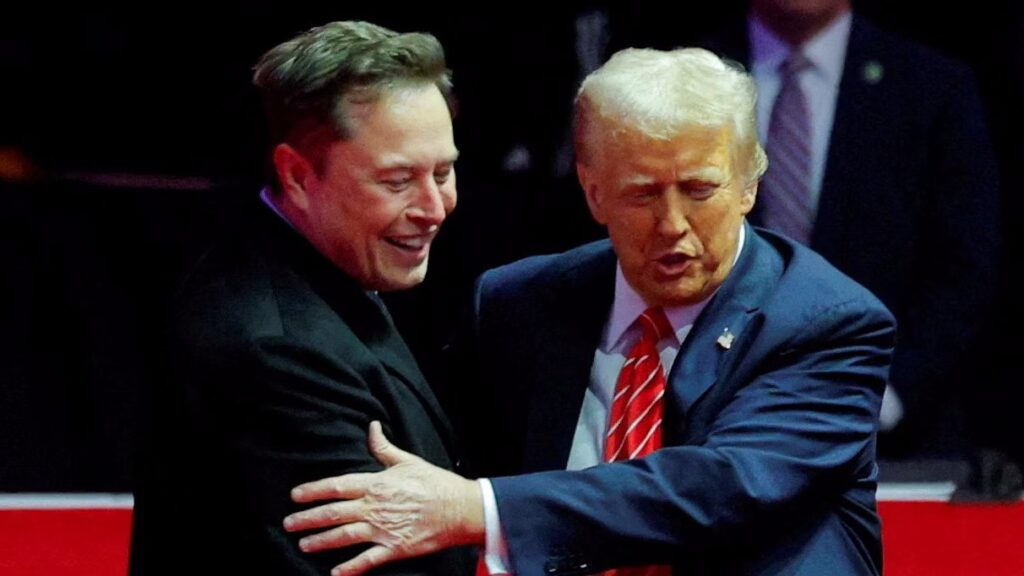Letter: Trump and White Afrikaners – Déjà Vu for a South African Expatriate

Elon Musk and Donald Trump. Photo: heute.at (CC BY 4.0 International)
As a white South African and naturalized Citizen of the United States. I am appalled at the actions of President Trump concerning South Africa and the shameful and disrespectful ambush of its president, in the Oval Office on May 21.
I was born, raised, and educated in Apartheid South Africa, and earned my medical degree from the University of the Witwatersrand in 1969. The injustices of Apartheid towards the majority Black population were in plain sight to me even as a child. I saw how families were separated – the wife and child of the Zulu man working in our Johannesburg home required official authorization to visit him and even then, for a limited period only. The Afrikaner Nationalist government forcibly displaced Black people to designated homelands (Bantustans), which were the least fertile areas and lacked the basic resources to sustain them. I saw the police vans roaming the suburbs, with police standing on the back, ready to chase and arrest black individuals who did not have the required passbook with the necessary permission to work in white areas and would face removal. As a young physician, while traveling through a homeland during a cholera epidemic, I witnessed women collecting water from a stream which received the wastewater from the crowded shacks on the hills above. I saw first-hand the impact of Apartheid on the health of the majority Black population where Third World preventable diseases were rampant while the health problems among Whites followed the same pattern as in the Western world.
In June, 1976, I emigrated with my family to the United States on a green card. Although not forced to leave South Africa, we considered ourselves self-exiles due to the increasing danger to dissidents against Apartheid, with detention without trial, interrogations, and ‘suicides” in custody all too frequent. Unlike many brave South African activists, we were unwilling to take these risks as parents of three small children. We arrived in the United States just prior to the start of the Soweto uprising when police opened fire on schoolchildren protesting their inferior Bantu education and instruction in Afrikaans. This uprising galvanized the struggle against the Apartheid government at home and abroad, culminating in 1994 with the birth of the new South Africa, with Nelson Mandela as president, despite efforts by Afrikaner extremists to derail it.
Watching from abroad, it was immensely moving that South Africa had turned the page on its long history of white supremacy and adopted a new constitution that stands for all its people irrespective of language, color, or gender identity. Unlike the claims of the Trump administration, the newly elected South African government never sought retribution against Afrikaner nationalists. There was no attempt to erase the painful past but rather to process it through the Truth and Reconciliation hearings. Some of the hearings included testimonials about torture of Black activists on farms equipped for the purpose. Yet, despite Apartheid’s crimes, Afrikaners were not ostracized. They participate in the government and Afrikaans remains one of the twelve official languages of the country. The old anthem, “Die Stem” was retained as a verse in the current national anthem, which is sung with great gusto by the national rugby team and truly reflects the Rainbow Nation.
Thirty years later, structural inequality from colonial and Apartheid policies, which were designed to maintain white minority dominance in wealth and land, persists. This contributes to continued challenges of joblessness, economic disparity, and a high crime rate, which affects all South Africans but especially the black population. Although they make up 87% of the population, black South Africans own only 4% of the land, whereas whites, who comprise only 7.3% of the population, own 72%. Fair redistribution of land is essential to rectify income inequality and land dispossession of black Africans. It is long overdue, but difficult to achieve harmoniously as land is seldom given up willingly.
The welcoming of the white Afrikaners as refugees by President Trump is deplorable and screams of racism and white supremacist ideology. What other conclusion can be drawn from this action given that they are not refugees and Trump has halted the program for legitimate refugees from other parts of the world? Meanwhile, he is also implementing his cruel mass deportation program which targets mainly black and brown people who have migrated to the United States seeking asylum or a better opportunity. These are not the values enshrined in our constitution, but will our constitution prove resilient enough to withstand the rise of white supremacy under a strongman leader? We the people must act.
Margaret McLaren, MD
Margaret McLaren is a dual national of South Africa and the United States and a resident of Amherst.

I am grateful to have learned from your thoughtful letter and continue to be embarrassed by the treatment of foreign leaders in the Oval Office. What happened to the Statesman/President concept?
Thanks for sharing this powerful testimony about life in Apatheid South Africa and the alarming parallels with today’s USA. Bravo, Margaret!
Oh Margaret thank you for writing this. Your move to the US has inspired Jimmy and me for years and years, and ‘m even more inspired as I read your words. Thank you for sharing your reflections with all of us. It is indeed shameful. Thank you for reminding us of the Truth and Reconciliation Commissions and the purposeful way that Mandela’s government tried to include Afrikaaners. Thank you Margaret. Love, Margaret 🙂
Thank you Margaret for your truthful heartfelt words and for sharing perspective from your experience in South Africa. Spot on